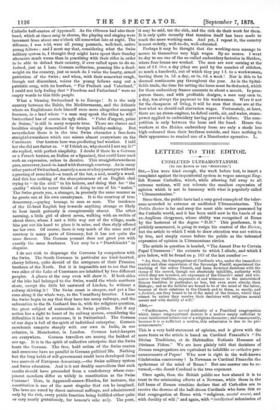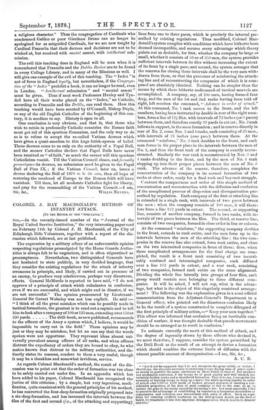LETTERS TO THE EDITOR.
UNDILUTED ULTRAMONTANISM.
[TO THE EDITOR OF THE"SPECTATOR."]
Sru,—You were kind enough, the week before last, to insert a complaint against the inquisitorial system in vogue amongst Eng- lish Roman Catholics, which, while allowing full sway to all extreme notions, will not tolerate the smallest expression of opinion which is not in harmony with what is popularly called " Ultramontanism."
Since then, the public have had a very good example of the toler- ance accorded to extreme or undiluted Ultramontanism. The Dublin Review is far and away the most able review possessed by the Catholic world, and it has been until now in the hands of an ex-Anglican clergyman, whose ability was recognised at Rome by the bestowal of the degree " D.D." This gentleman, it is publicly announced, is going to resign his control of the Review, but the article to which I wish to draw attention was not written by him, and simply comes before the public as the tolerated expression of opinion in Ultramontane circles.
The article in question is headed, "The Assent Due to Certain Papal Utterances ;" the extracts to which I allude, and which I give below, will be found on p. 163 of the last number :—
4, As, then, the Congregations of Cardinals who, under the immediate control and close supervision of the Sovereign Pontiff, superintend the teaching of the entire Church, and issue doctrinal decisions with the stamp of the sacred, though not absolutely infallible, authority with which they are invested, are exponents of the Church's mind and wit- nesses to her tradition, exponents of and witnesses to the untarnished Roman tradition in particular, no less, but even more closely, than Bishops ; and as the faithful are bound to be of the mind of the latter, because of their relations to the Church and to them, so surely, and a fortiori, are they bound to be of the mind of the former, which they cannot be unless they receive their decisions with religious mental assent and with docility of will."
Also,— " Furthermore, the sacred authority of a Pontifical congregation which issues congregational decrees is a motive amply sufficient to exact intellectual submission of a religions character ; and consequently, because it is so sufficient a motive, this submission is due to its pro- nouncements."
This is a very bold statement of opinion, and is given with the more force as the article is based on Cardinal Franzelin's "Dc Divina Traditione, et de Habitudine Rationis Hums= ad. Divinam Fidem." We are here plainly told that decisions of Roman congregations are equivalent to infallible ex cathedra pro- nouncements of Popes ! Who now is right in the well-known Gladstonian controversy? Is Newman or Cardinal Franzelin the spokesman of the mind of Rome ? But one answer can be re- turned,—the Jesuit Cardinal is the true exponent.
Once again, then, the British public see how absurd it is to trust to the minimising efforts of a Newman, while those in the full beam of Roman sunshine declare that all Catholics are to receive the decrees of the half-dozen Cardinals who form this or that congregation at Rome with "religious, mental assent, and with docility of will ;" and again, with "intellectual submission of
a religions character." Thus the congregation of Cardinals who condemned Galileo or poor Giordano Bruno can no longer be apologised for as misguided Cardinals, for we are now taught by Cardinal Franzelin that their decrees and decisions are not to be winked at, but received with mental assent, with intellectual sub- mission.
The evil this teaching does in England will be seen when it is remembered that Franzelin and the Dublin Review are to be found in every College Library, and in many of the Missions as well. I will give one example of the evil of this teaching. The "Index "is not of force in England legally, but nevertheless, if the Congrega- tion of the "index" prohibit a book, it can no longer be read, even in London. "intellectual submission" and "mental assent" must be given. Thus if next week Professors Huxley and Tyn- dall have all their works placed on the "Index," no Catholic, according to Franzelin and the Dublin, can read them. How this teaching would have been scouted by O'Connell, Bishop Doyle, or any of the old English Catholics of the beginning of this cen- tury, it is needless to say. History is open to all.
One conclusion is very obvious, and that is, that those who wish to retain in professedly Catholic countries the Roman faith must get rid of this spurious Romanism, and the only way to do so is to refuse to accept the so-called Vatican decrees which have given a quasi-sanction to this huge fetish-system of belief. Those decrees come to us only on the authority of a Papal Bull, and the sooner Catholics declare that Papal Bulls have never been received as" of faith," so much the sooner will this spurious Catholicism vanish. Till the Vatican Council closes, and formally promulgates its decrees, no submission need be given to the Papal Bull of Pins IX.; if the Vatican Council, later on, issues a decree declaring the Bull of 1870 to be its own, then all hope of restoring the manhood of Europe to the Roman faith will have vanished. Till then, let all moderate Catholics fight for liberty, and pray for the reassembling of the Vatican Council.—I am,































 Previous page
Previous page